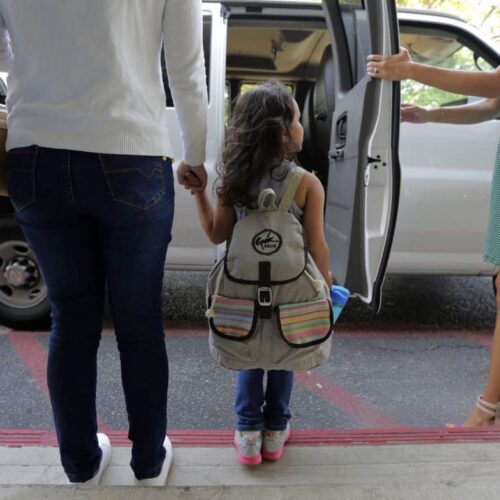Introduction
Aug. 6, 2018: This story has been updated.
Lawyers for a group of migrant children are fighting to ensure that the kids can plead for asylum independently of their parents’ cases—even though the children have been reunited with their parents after prolonged separation at the border.
Six minor plaintiffs in the lawsuit—which adds a new twist to an ongoing battle over migrant families—are now with parents and held in family detention in Texas. During their period of separation, some of their parents failed to pass so-called “credible fear” asylum interviews and some signed forms that put families in a pipeline toward deportation.
Pro bono lawyers with the firm Hogan Lovells argue in a lawsuit filed in U.S. District Court in Washington D.C. on Monday that parents who signed these forms did so under duress and without understanding the documents.
“They basically gave the parents a Hobson’s choice,” said T. Clark Weymouth, one of the minor plaintiffs’ attorneys, speaking of U.S. officials. If they didn’t sign the forms, some parents thought they wouldn’t see their children again, he said.
Weymouth and other attorneys argue that U.S. Department of Homeland Security officials “intend to embark on a policy of immediately deporting reunified families in which one of the parents has been given an expedited removal order, without honoring the minor children’s individually vested rights to seek asylum.”
Plans to deport families “deprives the children of their fundamental right to due process and to seek asylum prior to repatriation,” according to the suit. The six minors’ parents filed the suit on behalf of their children and are asking for an injunction to prevent the deportation of families in a similar situation.
Justice Department attorneys argue in a filing that if the D.C. court prevented “the government from allowing a parent to waive her child’s rights,” such an injunction would interfere with ongoing litigation related to migrant families and “undermine the orderly administration of justice.”
J.M.A., one of the minor plaintiffs in the suit, is a 13-year-old Honduran boy who was separated from his father and placed in at a shelter in San Antonio, Texas for 58 days.
While there, the boy “suffered tremendous fear, anxiety and uncertainty during this detention” and “did not know whether he would ever see his father again” because officials allegedly did not provide him information, according to the suit.
By the time the boy was reunited with his father in family detention in Karnes City, Texas, J.M.A.’s father had already sat through and failed a credible fear screening interview for asylum. He was issued an “expedited order of removal,” which is a deportation order.
But J.M.A. has now requested a chance to explain his fear to immigration or asylum officers. His asylum claim could benefit his father also, Weymouth explained.
J.M.A. does not want to return to Honduras because he fears that the 18th Street Gang, a transnational crime group, will kill him and his father. The lawsuit says that the 18th Street Gang is “the same gang that has previously threatened them, and maimed J.M.A.’s father in a knife attack.”
Earlier this year, a now-defunct Trump Administration policy sought to deter mostly Central American migrants crossing the southern border by immediately prosecuting all adults for a first-time crossing.
This policy required jailing the adults and sending adults’ children off to custody in shelters around the country. A wave of criticism that the policy was cruel and haphazard led the administration to halt it, and a federal judge in San Diego ordered U.S. officials to unite the families.
Lawyers for the child plaintiffs filing the suit in Washington assert that hundreds of other children could also have credible pleas for asylum that might be foiled by swift deportation, allegedly in violation of the children’s right to due process.
Hogan Lovells attorneys also oppose a U.S. Justice Department request that the federal court in Washington transfer the suit to San Diego, where federal Judge Dana Sabraw presides over a case that in which he ordered U.S. officials to unite families they split up at the border.
(Update, Aug. 6, 2018, 6 a.m.: On Friday,, Judge Paul Friedman announced his decision to transfer part of the case to California under Judge Sabraw. Friedman kept jurisdiction over the claim that the removal form is noncompliant with the law.)
The Justice Department argues that Sabraw understands the “familial relationship” and claims that the parents are entitled to act on behalf of their children in litigation.
Because there has been “no showing that reunified parents are unfit or otherwise not entitled to act on behalf of their children,” Justice attorneys argue, “claims that are purportedly brought on behalf of their children should not be separately considered in this action.”
Justin Bernick, lawyer for the plaintiffs, said in a hearing Tuesday in D.C. federal court before Judge Paul Friedman that Sabraw has only dealt with cases concerning parents’ rights. In addition, he said, the forms parents were given to sign are government-sanctioned “written forms” that can only be challenged within the jurisdiction of the D.C. federal court.
Judge Friedman could decide Friday if he’ll transfer the suit.
E.A.H., a 6-year-old Honduran boy, is another plaintiff who was taken to a shelter in Harlingen, Texas, where he stayed for 33 days. During their separation E.A.H.’s father didn’t pass a credible fear interview either. He claimed that he was so worried about his son, who’d been separated from him, that he couldn’t concentrate on questions, according to the minors’ lawsuit.
E.A.H.’s father signed a form agreeing to deportation, he said, because he was told he would “be reunited with his son the same day.” Father and son assert that E.A.H.’s father has been targeted by gang members for refusing to support them, the lawsuit alleges.
The plaintiffs’ lawsuit asserts that: “Honduras is characterized by constant violence, a destabilizing government and official corruption.”
“It is a particularly dangerous place for young people,” the suit also asserts. The suit cites a report by the relief group Save the Children that found that in 2017 Honduras had the highest rate of child homicide in the world at 10 times the global average. El Salvador was the third highest and Guatemala was the sixth highest.
READ MORE:
Family separation, U.S. treaties and asylum obligations: What’s legal?
How border migration is testing the public’s grasp of due process and U.S. asylum obligations
Michigan official says migrant kids sent across country without sure way to find parents
Read more in Inequality, Opportunity and Poverty
Immigration Decoded
Commentary: Trump’s immigration blame game
Migrants have long assumed costs, risks of border crossing—but Trump’s finger pointing now adds to the burden.
Immigration Decoded
ICE failed to penalize contract immigrant jails with thousands of safety and rights violations
Federal watchdog says contractors failed to report sexual assaults and staff misconduct to ICE investigators.



Join the conversation
Show Comments